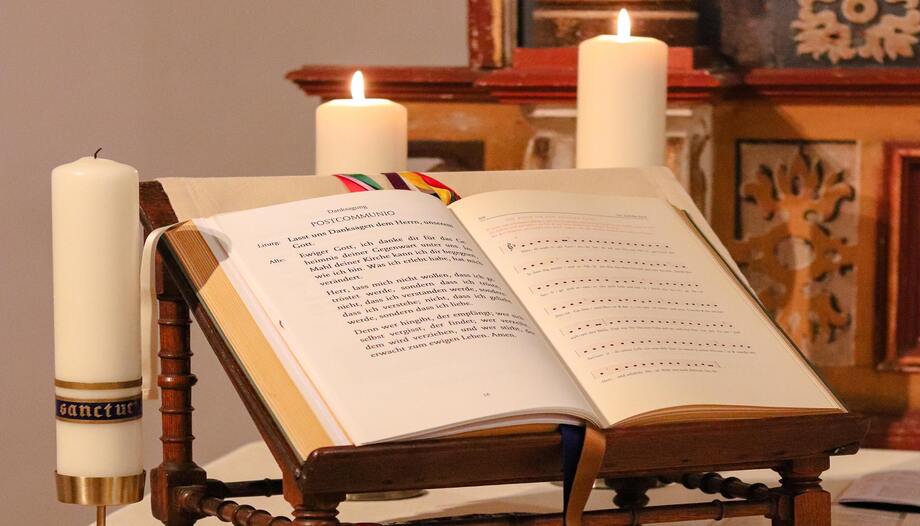 "The Transfiguration shows us the way", II Sunday of Lent
"The Transfiguration shows us the way", II Sunday of Lent Spanish bishops encourage care during Holy Week celebrations
Spanish bishops encourage care during Holy Week celebrationsThe Collect for the Second Sunday of Lent is a newly composed text. It is not inspired by the Roman tradition but by liturgical sources from other Western traditions, such as the old Spanish and French traditions; but above all it is inspired by the Gospel which for centuries has been linked to this day: the Transfiguration of the Lord (Mt 17:1-9 and parallels). It must be recognized that, in general, it is not common for there to be such a close relationship between prayers and readings at Sunday Mass.
O God, you have commanded us to listen to your beloved Son,nourish our spirit with your word;so that, with a clean look,Let us joyfully behold the glory of your face. Deus, qui nobis diléctum Fílium tuum audíre praecepísti,verbo tuo intérius nos páscere dignéris,ut, spiritáli purificáto intúitu,glóriae tuae laetémur aspéctu.
The need to take a break on the road
At first glance it might seem that this prayer is not in tune with the idea we generally have of Lent, which is more linked to the theme of conversion and penance. But what the Church wants is to strengthen our faith so that we live Lent properly, in the same way that Jesus did with his apostles on that last ascent to Jerusalem before his Passion. This collection helps us to pray the mystery of the Transfiguration.
It follows a very classical structure. First, a simple invocation to God the Father. Then, the anamnesis, which conveys a reference to the words pronounced by the Father about the Son: "This is my Son, the Beloved, in whom I am well pleased; listen to him". Finally, two petitions through which the priest gathers the prayers of the whole assembly.
Before speaking of what we ask of God, it seems necessary to dwell on what God asks of us: to listen to his Son. Conversion will be possible only if we listen to Jesus. The works of penance will have meaning only if they serve to make us freer to listen to Jesus. Practices that are closed in on themselves, done for the sake of compliance, or that make us close ourselves up in spiritual self-complacency, with the consequent danger of "Pelagianism" about which Pope Francis warns, will be of no use.
The imminent liturgy of the Word is the privileged moment to listen to God, because through the proclamation of the readings, God speaks to his people and Christ announces his Gospel. For their part, the assembled people welcome and make the Word of God their own through their singing, their acclamations and also their meditative silence.
Preparing for glory
This collection is directly related to the Gospel and to the entire liturgy of the Word. This becomes more evident when we examine the first petition: that God may deign to feed us interiorly with his word. We are reminded that, through the Holy MassGod feeds his people at the twofold table of the Word and the Eucharistic Bread. The Good Shepherd gives us good pasture as food, instructing us, teaching us, "for man does not live by bread alone, but by every word that comes from the mouth of God". He even gives us Himself as food. This will be our sustenance during the Lenten fast and abstinence.
The Word of God has a character of performative. He explained Benedict XVI in the apostolic exhortation Verbum Domini: "In the history of salvation there is no separation between what God says and what he does; his Word itself manifests itself as living and efficacious." Therefore, it is his Word, as it enters into us, that will achieve for us a purified spiritual outlook (spiritali purificato intuitu). This is what Lent is meant to achieve.
Here our conversion is expressed in terms of the inner look of the soul because it is put in immediate relation not so much with what we leave behind (sin) but with what we want to achieve: to be recollected (laetemur) with the countenance, with the sensitive appearance, with the presence in front of us (aspectu) of divine glory. What Peter, James and John were able to do for a moment on Tabor, and what they already enjoy eternally in Heaven. In this way, we are told that to live Lent is to relive mystically the event of Tabor, to prepare ourselves for the glory of Heaven, allowing ourselves to be nourished and purified by God here on earth.
Priest from Peru. Liturgist.











